Publikationen
-
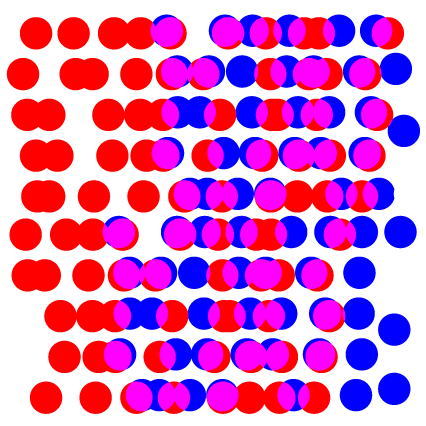 Natalja Gorbanewskaja. Graphic Novel
Natalja Gorbanewskaja. Graphic Novel„Sie war eine Dichterin so groß wie Joseph Brodsky und eine Menschenrechtsaktivistin so unerschrocken wie Andrej Sacharow. Im Gegensatz zu Brodsky erhielt sie jedoch nicht den Nobelpreis für Literatur, im Gegensatz zu Sacharow auch nicht den Friedensnobelpreis. Mit ihrem Namen ist aber ein in der Sowjetunion einmaliges Ereignis verbunden: Am 25. August 1968 kommt sie mit sieben weiteren jungen Menschen auf den Roten Platz, um offen gegen das Regime zu demonstrieren – und gegen die Niederschlagung des Prager Frühlings durch Panzer der Sowjetunion und anderer Länder des Warschauer Paktes.“
-
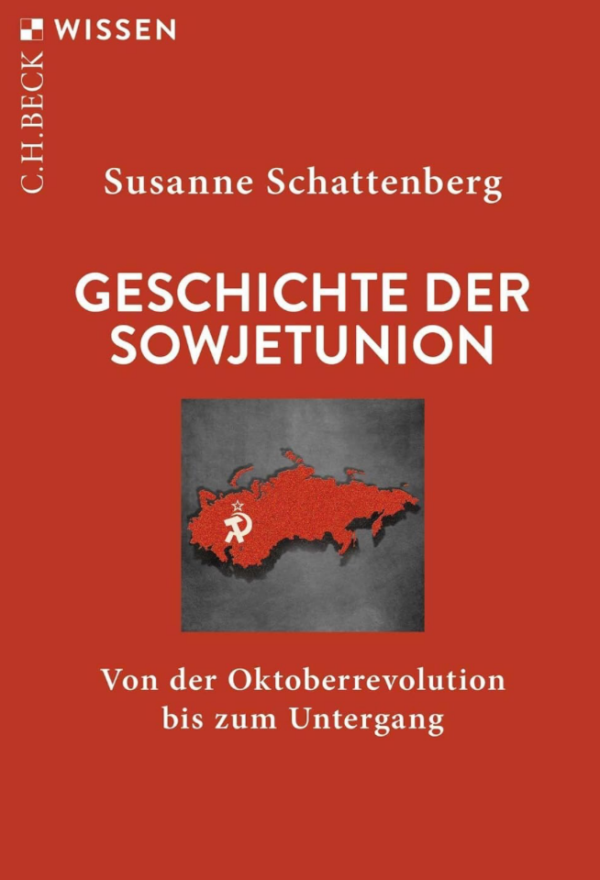 Geschichte der Sowjetunion. Von der Oktoberrevolution bis zum Untergang
Geschichte der Sowjetunion. Von der Oktoberrevolution bis zum UntergangNach den Revolutionen des Jahres 1917 und einem blutigen Bürgerkrieg wurde am 30. Dezember 1922 die Sowjetunion gegründet. Am 21. Dezember 1991 löste sie sich auf. Dazwischen liegen 69 Jahre, in denen sie die Welt prägte – durch den stalinistischen Terror, durch ihren Sieg über die Armeen Hitlerdeutschlands, als Atommacht im Kalten Krieg und mit Gorbatschows Entspannungspolitik. Bis heute lastet ihr Vermächtnis auf dem postsowjetischen Raum. Im Inneren brachte sie unter Stalin Hungersnöte, Deportationen, den Gulag und willkürliche Erschießungen. Aber gleichzeitig erfuhr das Land eine grundlegende Modernisierung, war der erste Mann im All ein Sowjetmensch. Susanne Schattenberg durchmisst die Jahre unter dem Sowjetstern und zeigt, wie sie bis heute nachwirken.
-
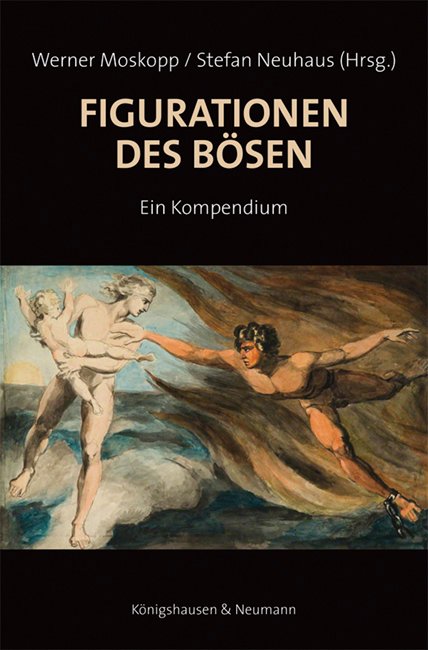 Hagen von Tronje: Vom Antagonist zum Bösewicht zum Antiheld. Überlegungen zur diachronen Entwicklung und Rezeption einer Antagonistenfigur
Hagen von Tronje: Vom Antagonist zum Bösewicht zum Antiheld. Überlegungen zur diachronen Entwicklung und Rezeption einer AntagonistenfigurIn Moskopp, Werner & Stefan Neuhaus (Hrsg.), Figurationen des Bösen. Ein Kompendium, 185-198. Würzburg: Königshausen & Neumann.
-
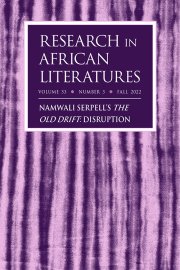 Introduction. Namwali Serpell’s The Old Drift: Disruption
Introduction. Namwali Serpell’s The Old Drift: DisruptionResearch in African Literatures 53(3). 1-22. https://www.muse.jhu.edu/article/900030
-
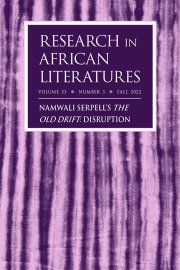 Namwali Serpell’s The Old Drift: Disruption (Special Issue)
Namwali Serpell’s The Old Drift: Disruption (Special Issue)Research in African Literatures, the premier journal of African literary studies worldwide, serves as a stimulating vehicle in English for research on the oral and written literatures of Africa. Reviews of current scholarly books are included in every number, and a forum offers readers the opportunity to respond to issues raised in articles and book reviews.
-
 State of the Planet. Homi Bhabha and Namwali Serpell in Conversation
State of the Planet. Homi Bhabha and Namwali Serpell in ConversationAfter explaining the rationale for bringing the author of The Old Drift, Namwali Serpell, and critical theorist Homi Bhabha into conversation, this interview with both of them explores some of the key themes of Serpell’s novel in relation to its wider geopolitical and historical context. Beginning with how we can understand the state of the planet in the present historical moment, the discussion expands to explore the broad context of more themes in the novel, which includes the place of gender and sexual politics, a global pandemic in a time of national and financial closures, cosmopolitanism, the space race and reverberations of the Cold War in the present, and the continued relevance, if any, of postcolonial theory, technology, revolution, and futurity.
-
 Agency and Incentives of Diasporic Political Influencers on Facebook Malawi
Agency and Incentives of Diasporic Political Influencers on Facebook MalawiThis article examines the agency and incentives that drive the activism of diasporic political influencers on “Facebook Malawi,” an online imagined political community. In their seminal work on “social media dissidents” and “social media self-made activists” in the Global South, Matsilele and Sharra demonstrate that social media activists engage with different strategies to initiate movements, mobilize citizens, and create their brands in strong opposition to authoritarian regimes which repositions them as freedom fighters in the eyes of the masses and enemies of the state. Correspondingly, we frame diasporic political influencers as actors aided by digital technologies who engage in “long-distance nationalism” on Facebook against authoritarianism in the homeland. We deploy a qualitative mixed methods approach to analyze Facebook data of two diasporic political influencers, Onjezani Kenani and Manes Winnie Hale, who gave informed consent to use their Facebook data generated in 2018 and 2021, a period preceding and following the 2019 Malawi tripartite elections. A thematic analysis of 250 Facebook posts and interview data with the two influencers illustrates how they exercise their agency in their quest for a vision of a better Malawi while navigating a complex and ambivalent web of online and offline threats, incentives, and interests. Implicated in the political communication and mobilization of the two are different strategies that include verbal inventiveness, trolling, and exposing. The article also shows how the concept of long-distance nationalism needs to be adapted in studying diasporic political influencers.
-
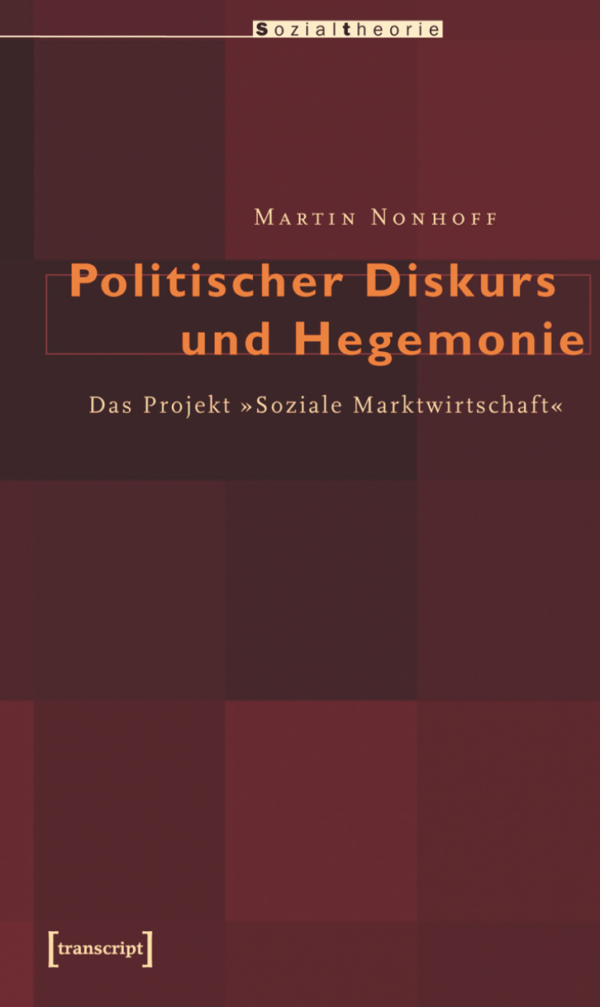 Politischer Diskurs und Hegemonie. Das Projekt »Soziale Marktwirtschaft«
Politischer Diskurs und Hegemonie. Das Projekt »Soziale Marktwirtschaft«Wie entstehen dominante politische Sprach- und Denkmuster und wie hängen sie mit den gesellschaftlichen Machtverhältnissen zusammen? Diesen Fragen nach dem Funktionieren diskursiver Hegemonien will der vorliegende Band unter der Verknüpfung von Politik- und Diskurswissenschaft auf den Grund gehen. Anhand der Untersuchung des hegemonialen Projekts »Soziale Marktwirtschaft« werden die politisch-diskursiven Charakteristika und Strategien erfolgreicher Hegemonien rekonstruiert. Zudem veranschaulicht die exemplarische Analyse des westdeutschen wirtschaftspolitischen Diskurses der Nachkriegsjahre, wie die Politikwissenschaft von diskurswissenschaftlicher Forschung profitieren kann.
-
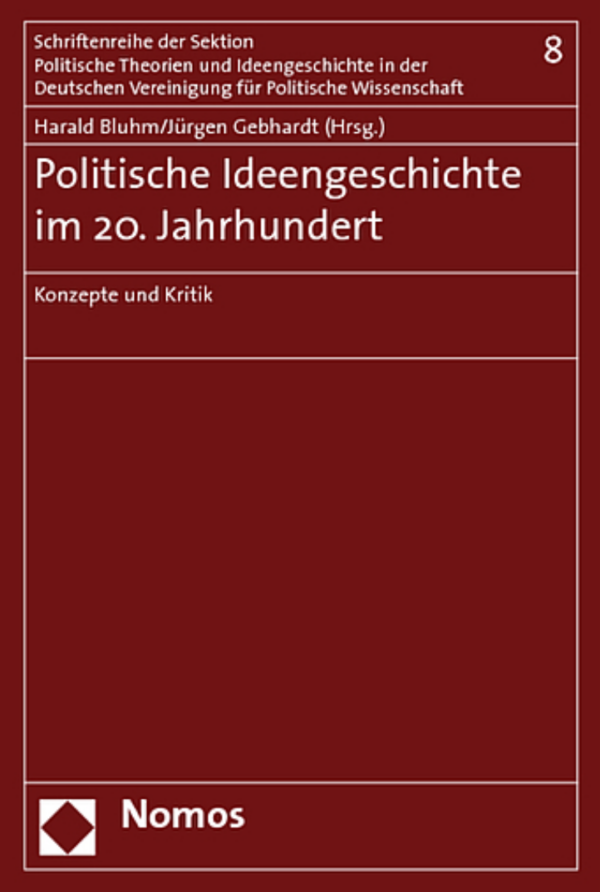 Politische Ideengeschichte und politische Hegemonie. Anmerkungen zum ‚Battle of the Books‘ an den amerikanischen Colleges
Politische Ideengeschichte und politische Hegemonie. Anmerkungen zum ‚Battle of the Books‘ an den amerikanischen CollegesIn Bluhm, Harald & Jürgen Gebhardt (Hrsg.) Politische Ideengeschichte im 20. Jahrhundert, 223–242. Baden-Baden: Nomos. ISBN: 978-3-8329-2181-1
-
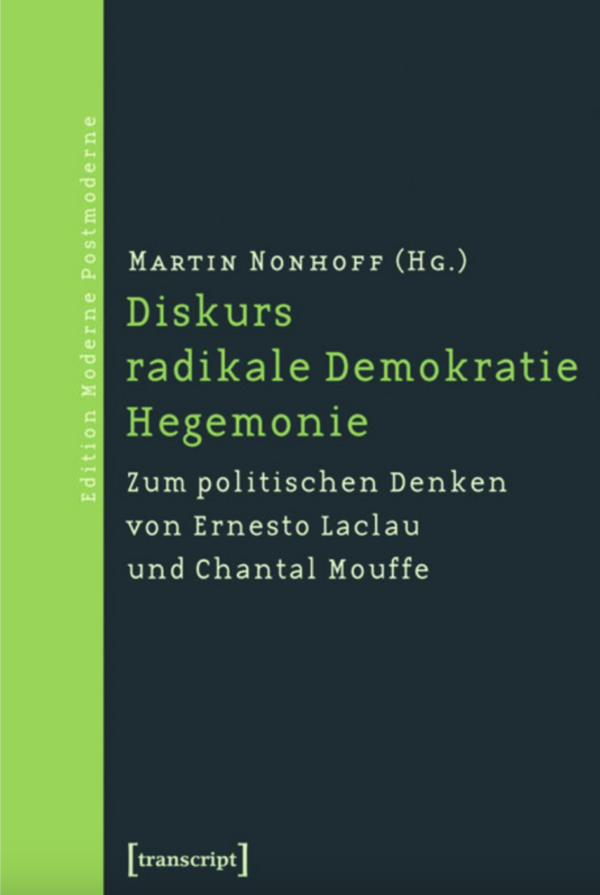 Diskurs – radikale Demokratie – Hegemonie.
Diskurs – radikale Demokratie – Hegemonie.Wenige politische Denker haben den internationalen politik- und sozialwissenschaftlichen Theoriediskurs der vergangenen Jahre so beeinflusst wie Chantal Mouffe und Ernesto Laclau – über Paradigmengrenzen hinweg. Beide verknüpfen neo-gramscianische, (post-)strukturalistische und psychoanalytische Theorieelemente und ermöglichen damit einerseits eine Erklärung von Ereignissen des politisch-diskursiven Geschehens, insbesondere der Ausbildung von Hegemonien, und andererseits eine normative Theorie der agonalen Demokratie.
Die Beiträge dieses Bandes geben einen Überblick über wesentliche Denkfiguren von Laclau und Mouffe, setzen sich mit diesen kritisch auseinander und zeigen methodische und empirische Anschlussmöglichkeiten auf.
Dieser Band enthält u.a. Originaltexte von Ernesto Laclau und Chantal Mouffe.
-
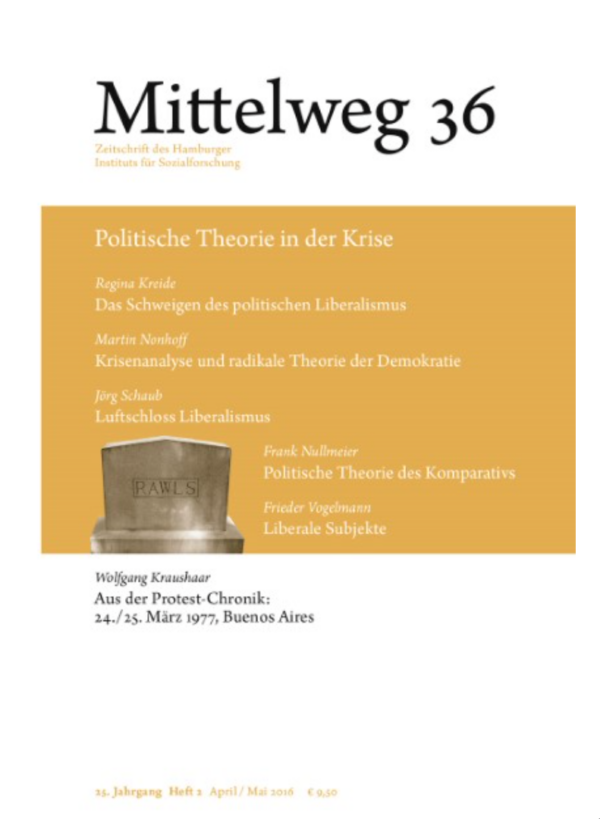 Politische Theorie in der Krise
Politische Theorie in der KriseMartin Nonhoff/Frieder Vogelmann: Editorial (Seite 3); Regina Kreide: Das Schweigen des politischen Liberalismus (Seite 5); Martin Nonhoff: Krisenanalyse und radikale Theorie der Demokratie (Seite 21); Jörg Schaub: Luftschloss Liberalismus. Warum das Denken in Krisenzeiten keinen Halt findet (Seite 38); Frank Nullmeier: Politische Theorie des Komparativs. Soziale Vergleiche und gerechte Gesellschaft (Seite 56); Frieder Vogelmann: Liberale Subjekte Eine affirmative Streitschrift (Seite 74); Wolfgang Kraushaar: Aus der Protest-Chronik: 24./25. März 1977, Buenos Aires (Seite 91)
-
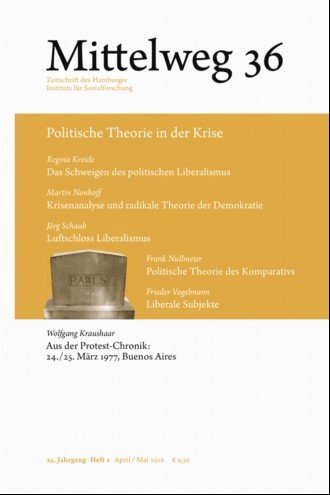 Krisenanalyse und radikale Theorie der Demokratie
Krisenanalyse und radikale Theorie der DemokratieMittelweg 36. Zeitschrift des Hamburger Instituts für Sozialforschung 2(2016). ISBN: 978-3-86854-736-8
-
 Discourse Analysis as Critique
Discourse Analysis as CritiqueThis paper intervenes in the discussion about the relationship between discourse analysis and critique. It argues that this relationship can be understood either as an external or as an integrated relationship. In an external relationship, there is first social criticism that is then braced by discourse analysis, that is, the latter aims at giving empirical credence to the critique. However, such an external relationship cannot give us any insight concerning the critical potential that is specific to discourse analysis, precisely because in this case critique exists before and independent of discourse analysis. If, however, critique emanates from discourse analysis itself, we would speak of an integrated relationship and would no longer speak of discourse analysis and critique, but of discourse analysis as critique. It is argued that such an integrated relationship becomes visible once we think of discourse analysis as being itself a discursive formation and ask what unsettling effects this formation has on research objects, on subject formations and on the academic production context in which they are conducted.
-
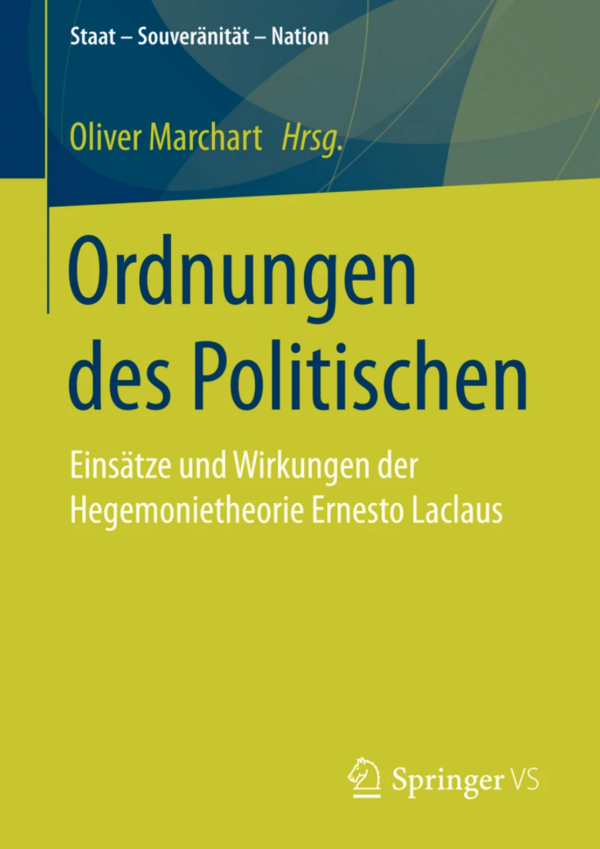 Antagonismus und Antagonismen – hegemonietheoretische Aufklärung
Antagonismus und Antagonismen – hegemonietheoretische AufklärungIn Oliver Marchart (Hrsg.) Ordnungen des Politischen. Einsätze und Wirkungen der Hegemonietheorie Ernesto Laclaus, 81–102. Wiesbaden: Springer VS. printISBN: 978-3-6581-7258-9 ebook ISBN: 9783-6581-7259-6
-
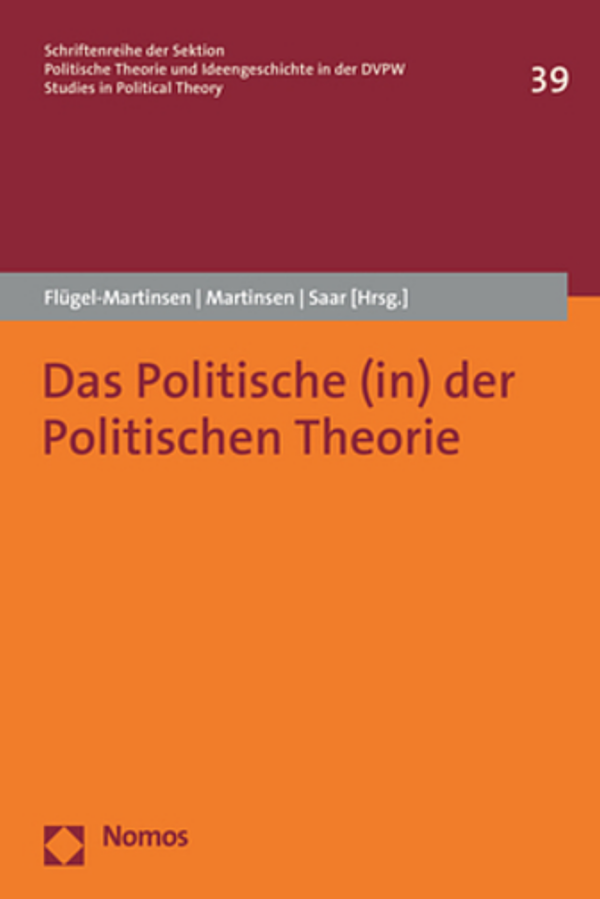 Das Politische und die Option auf Herrschaftskritik, oder: Populismus
Das Politische und die Option auf Herrschaftskritik, oder: PopulismusIn Flügel-Martinsen, Oliver, Franziska Martinsen & Martin Saar (Hrsg.) Das Politische (in) der Politischen Theorie. Stuttgart: Nomos. printISBN: 978-3-8487-8414-1 ebook ISBN: 978-3-7489-2790-7
-
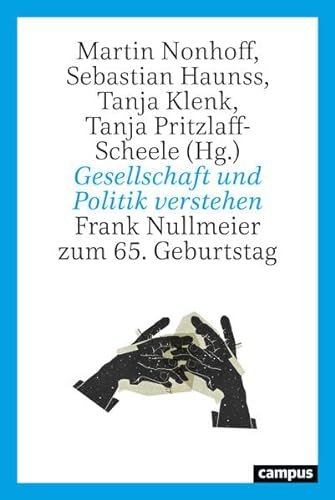 Radikale Demokratietheorie als Gesellschaftstheorie
Radikale Demokratietheorie als GesellschaftstheorieIn Martin Nonhoff, Sebastian Haunss, Tanja Klenk & Tanja Pritzlaff-Scheele (Hrsg.) Politik und Gesellschaft verstehen. Frank Nullmeier zum 65. Geburtstag. Frankfurt/Main: Campus, 49–64. printISBN: 9783593516660 eBookISBN: 9783593453088
-
 Colonial Flashback im Museum. Was Missionsobjekte über kirchliche Erinnerungskultur erzählen
Colonial Flashback im Museum. Was Missionsobjekte über kirchliche Erinnerungskultur erzählenMissionssammlungen sind deutschlandweit materielles und ideologisches Kolonialerbe der Kirchen. Franziska Moosmann teilt Eindrücke ihrer Ausstellungsanalyse eines Missionsmuseums und lädt die Leser*innen auf einen Rundgang durch ausgewählte Räume ein. Dabei fragt sie, wie sich postkoloniale Theologie und Erinnerungskultur von den Objekten herausfordern und transformieren lassen müssen.
-
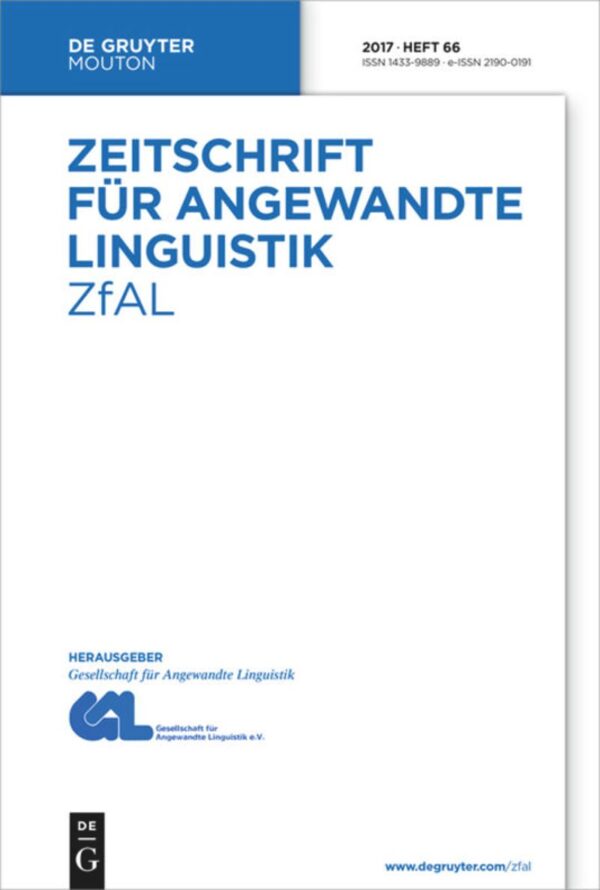 Marginalisierung in der Marginalität? Ein Blick auf digitale Räume anhand sprachlicher Konstruktion von randständigen Positionen im Kontext von Asexualität
Marginalisierung in der Marginalität? Ein Blick auf digitale Räume anhand sprachlicher Konstruktion von randständigen Positionen im Kontext von Asexualität„Our mascot should be a unicorn considering how many people don’t believe asexuality is a thing.“[1]
This article discusses marginalisation in internet forums and blogging platforms using the example of asexuality blogs and discussion threads. While large corpora of both English and German, such as COCA and DeReKo, contain hardly any mention of asexuality and these few instances of asexuality and related expressions typically refer to plant biology, online communities do discuss aspects of life as an asexual person and their experiences of marginalization even within the LGBTQ community. Definitions of asexuality, including its delineation from other identities, and how asexual people articulate conflicts and other issues on these online platforms are discussed in detail. Particular attention is paid to how this particular group is constructed by others, how they construct themselves as not being part of the mainstream, and the role (self-)marginalisation plays in this context.
-
 Digitale Räume als Aushandlungsort für Zentralität und Marginalität
Digitale Räume als Aushandlungsort für Zentralität und MarginalitätIn Auteri, Laura, Natascia Barrale, Arianna di Bella & Sabine Hoffmann (eds.) Jahrbuch für internationale Germanistik. Wege der Germanistik in transkultureller Perspektive. Akten des XIV. Kongresses der Internationalen Vereinigung für Germanistik (IVG) 6: 511-515. Bern: Peter Lang Verlag.
-
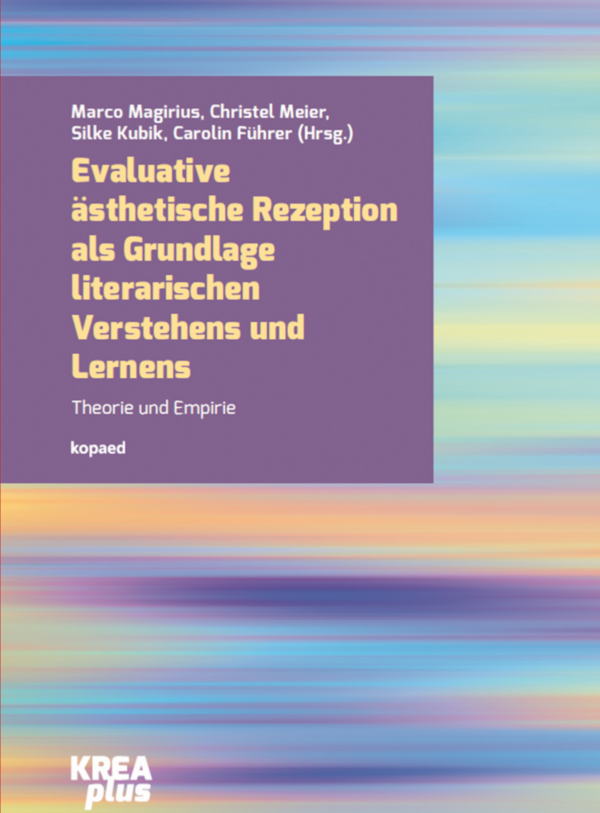 Gänsehaut, Liebe und Langeweile. Sprachliche Konstitution von Emotionen in Laienbuchrezensionen aus dem Schullektürekanon
Gänsehaut, Liebe und Langeweile. Sprachliche Konstitution von Emotionen in Laienbuchrezensionen aus dem SchullektürekanonIn Meier, Christel, Carolin Führer, Marco Magirius & Silke Kubik (eds.) Evaluative ästhetische Rezeption als Grundlage literarischen Verstehens und Lernens: Theorie und Empirie (KREAplus Band 28) 243–256. Muenchen: kopaed. ISBN: 978-3-96848-095-4